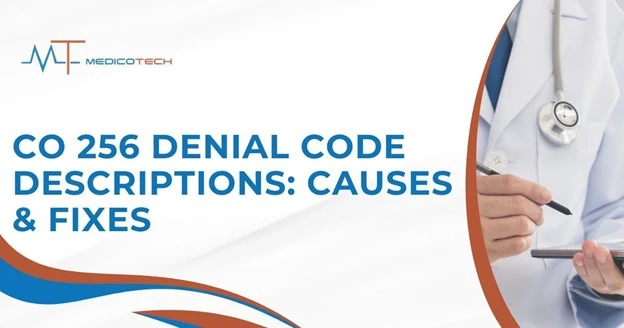What Does N65 Remark Code Mean in Healthcare Billing?
You might see the N65 Remark Code Description when you’re working on medical billing. Insurance companies often use this code to let providers know that there is a problem with the procedure code or the rate count on a claim. In short, the N65 remark code means that the payer’s system couldn’t check the procedure code that was billed or the number of services that were given on that date. This could be because the claim had wrong information or because the provider’s records don’t match up with the payer’s system.
Healthcare providers and billing specialists need to know what the N65 remark code means because it can help you find and fix mistakes quickly, which will speed up payments and improve your revenue cycle.
Common Reasons Behind the N65 Denial Code in Claims
The N65 remark code typically appears when there’s a mismatch between the details provided on a claim and what the payer’s system can validate. Here are some common reasons for receiving this denial:
- Incorrect Procedure Code: The code submitted on the claim might not match the one recognized by the payer’s system for the date of service. This could be a result of typographical errors or using outdated codes.
- Missing or Incorrect Rate Count: The rate count, which tracks the number of times a procedure was performed, could be missing or incorrectly reported.
- Outdated Procedure Codes: Medical coding evolves regularly. If you’re using outdated codes (like from ICD-9 instead of ICD-10), the payer’s system might not recognize them.
- Unlisted Procedure Codes: If the procedure code used isn’t recognized by the payer, it may indicate that it hasn’t been entered into their system yet or that it’s not included in their coverage.
- Contractual Issues: In some cases, the provider’s contract with the payer may not include the specific procedure code submitted, meaning it’s non-reimbursable for that service date.
Understanding the root causes of N65 denial codes can help you prevent them from affecting your practice.
How to Prevent N65 Errors in Your Medical Claims
Avoiding N65 remark code descriptions starts with ensuring that your medical claims are submitted with accurate and up-to-date information. Here’s how to prevent these errors:
- Update Your Code Master Regularly: Always ensure your practice’s charge master includes the most current CPT (Current Procedural Terminology) and HCPCS (Healthcare Common Procedure Coding System) codes.
- Verify Procedure Codes Before Submission: Prior to submitting claims, double-check that the procedure codes align with the services provided and are recognized by the payer.
- Train Your Staff: Ensure your billing team is trained in proper coding techniques and stays informed about any updates to payer-specific coding guidelines.
- Perform Pre-Claim Adjudication: Implement a process that checks for code validation before submitting claims to catch potential issues early.
By adopting these strategies, you can reduce the likelihood of encountering N65 denial codes and ensure smoother claim processing.
Step-by-Step Guide to Fixing N65 Remark Code Issues
If your claim is flagged with an N65 remark code, it’s important to act quickly to resolve the issue and get paid on time. Follow this step-by-step guide to address the problem:
- Verify the Procedure Code: First, check the procedure code submitted on the claim. Ensure it matches the most current codes and is appropriate for the date of service. If necessary, consult the latest coding manuals (CPT or HCPCS).
- Check the Rate Count: Review the rate count to make sure it reflects the correct number of services rendered. If it’s missing or incorrect, update it accordingly.
- Confirm Provider Information: Double-check that the provider’s details (including address and credentials) are correct and consistent with the payer’s records.
- Review the Contract: Ensure that the procedure code is covered by the provider’s agreement with the payer. If the procedure is not reimbursed under the terms of the contract, consider reaching out to the payer for clarification or renegotiation.
- Submit a Corrected Claim: If you find any errors, correct them and resubmit the claim. Make sure all the updated details are accurately reflected to avoid future denials.
- Contact the Payer: If the N65 remark code persists despite correcting the claim, contact the payer directly for clarification and provide supporting documentation if necessary.
By following these steps, you’ll be better prepared to address N65 remark code issues and ensure accurate reimbursement for services rendered.
Understanding the Role of N65 in Revenue Cycle Management
In the context of revenue cycle management (RCM), understanding the N65 remark code is critical to maintaining a smooth billing process. Denials like N65 can disrupt cash flow and delay payments, making it essential for healthcare providers to manage claims efficiently.
Implementing an effective process for verifying and correcting claims before submission can help reduce the frequency of N65 remark codes. By addressing these issues early, you can optimize your revenue cycle, speed up reimbursement, and minimize the time spent on resolving denials.
How to Avoid N65 Denials with Better Claim Submission Practices
One of the most effective ways to avoid the N65 remark code is by implementing better claim submission practices. By focusing on accurate and thorough claim preparation, you can significantly reduce the chances of receiving an N65 denial. Here are some key strategies:
- Double-Check Procedure Codes: Always verify the procedure codes before submitting claims. Ensure that the codes you are using are valid for the date of service and that they reflect the services provided accurately.
- Ensure Correct Rate Count: Make sure that the rate count, which represents the number of services performed, is correctly reported. Missing or inaccurate rate counts are a common cause for N65 denials.
- Use the Latest Coding: Coding systems like CPT and HCPCS are updated frequently. Be sure that your claims are using the most up-to-date codes to prevent mismatches with the payer’s system.
- Verify Payer Guidelines: Different payers may have specific requirements regarding how procedures should be coded. Familiarize yourself with these payer-specific guidelines to avoid unnecessary errors.
By implementing these practices, you can minimize the risk of N65 remark code denials and keep your claim submissions on track.
Key Strategies to Ensure N65 Denial Doesn’t Impact Your Bottom Line
The financial health of your practice is directly impacted by denials like the N65 remark code. To ensure that these denials don’t affect your bottom line, here are some strategies that focus on proactive claim management:
- Update Your Charge Master Regularly: Keeping your charge master updated with the latest coding changes is critical. This ensures that your practice’s codes reflect what’s recognized by the payer’s system.
- Train Your Team: Provide regular training for your billing team to stay updated on the latest codes and payer-specific requirements. A knowledgeable team will be more adept at identifying and preventing N65 denials.
- Implement Pre-Claim Audits: Before submission, run a pre-claim audit to identify potential issues with codes, rate counts, and provider details. Catching errors early can prevent denials and speed up the reimbursement process.
- Improve Documentation: Ensure that all claims are well documented. Having the correct supporting information, such as medical records or operative reports, can make it easier to resolve any discrepancies that may lead to an N65 denial.
- Leverage Technology: Invest in software that can help you identify errors before they are submitted. Automated coding checks and claim management systems can help reduce the occurrence of denials.
By applying these strategies, you’ll not only prevent N65 remark code denials but also improve your overall revenue cycle management.
What You Need to Know to Correct N65 Denials and Get Paid Faster
Correcting N65 remark code denials quickly is essential to keeping your cash flow intact. Here’s what you need to know about fixing these denials and speeding up the payment process:
- Review Your Claim: Start by reviewing the claim that was denied. Double-check the procedure code, rate count, and provider information to identify any discrepancies.
- Make Corrections: If you find errors, make the necessary corrections. This may involve updating the procedure code, adjusting the rate count, or ensuring that the provider’s address and other details match the payer’s records.
- Submit a Corrected Claim: Once you’ve made the corrections, resubmit the claim to the payer. Ensure that all updated information is accurate and clearly presented.
- Document Everything: Keep detailed records of all steps taken to correct the claim. This documentation can be helpful if the payer requests additional information or if you need to appeal the denial.
- Follow Up: If the claim is still denied after corrections, follow up with the payer. Contact their support team to understand why the denial was not resolved and provide any additional documentation they may need.
By swiftly addressing N65 denials, you can reduce the time it takes to get paid and ensure that your practice’s revenue cycle remains smooth.
Navigating the N65 Denial: Tips for Healthcare Providers
Navigating N65 remark code denials can be tricky, but with the right approach, you can resolve them efficiently. Here are some tips specifically for healthcare providers:
- Stay Organized: Keep all your billing information, codes, and payer agreements organized. This will help you quickly locate any discrepancies when a denial occurs.
- Use a Checklist: Implement a checklist to ensure all claim information is accurate before submission. This should include verifying the procedure code, rate count, provider address, and any other relevant details.
- Understand Payer Policies: Different payers have different requirements, so it’s important to stay up to date on their policies. Regularly check for any updates to coding practices or documentation requirements.
- Don’t Hesitate to Reach Out: If you’re stuck, don’t hesitate to contact the payer for clarification. They can provide guidance on what went wrong and help you get the claim corrected more efficiently.
By staying proactive and informed, healthcare providers can navigate N65 remark code denials with greater ease and efficiency.
How Accurate Coding Can Help You Avoid N65 Denials
One of the most important factors in avoiding N65 remark code denials is ensuring that your coding is accurate. Here’s how accurate coding can make a significant difference:
- Preventing Mismatches: Using accurate codes ensures that your claims match what the payer’s system recognizes, reducing the likelihood of receiving a denial.
- Minimizing Errors: Accurate coding means fewer mistakes, such as typographical errors or outdated codes, which are common causes of N65 denials.
- Faster Reimbursement: When codes are correct, the payer can process your claim more quickly, which leads to faster reimbursements and fewer follow-up actions.
- Compliant Claims: Accurate coding helps ensure that your claims comply with current coding standards (CPT, ICD-10, HCPCS), which helps prevent denials due to outdated or non-compliant information.
Investing time and resources into accurate coding can significantly reduce the risk of N65 remark code denials and keep your practice’s revenue cycle running smoothly.
Frequently Asked Questions (FAQs) about N65 Remark Code Description
- What is the N65 Remark Code?
The N65 remark code is used in healthcare billing to indicate that the procedure code or rate count for a claim could not be verified or is not on file for the service date or provider. This typically occurs when the payer’s system cannot recognize the code or when there is a mismatch between the provider’s records and the payer’s system. - What causes the N65 Remark Code to appear?
The N65 remark code may appear due to several reasons, including:
- Incorrect or outdated procedure codes.
- Missing or incorrect rate count for the procedure.
- A mismatch between the provider’s address and the location of service.
- The provider’s contract may not include the procedure code submitted.
- Errors in the claim form, such as formatting issues.
- How do I prevent N65 denials in my medical claims?
To prevent N65 remark code denials, make sure:
- Your procedure codes are up-to-date and correctly entered.
- The rate count is accurate and properly reported.
- Your provider’s details match the payer’s records.
- You stay updated on coding changes and payer-specific guidelines.
- Implement pre-claim audits and check for errors before submission.
- How can I fix an N65 denial once it occurs?
To fix an N65 remark code denial:
- Review the claim to identify the cause of the denial (incorrect code, rate count, or provider info).
- Correct any discrepancies in the procedure code, rate count, or provider information.
- Resubmit the corrected claim to the payer.
- If the denial persists, contact the payer for further clarification or submit additional supporting documentation.
- What if the N65 remark code persists despite making corrections?
If the N65 remark code continues after corrections, you should:
- Review the payer’s requirements again to ensure compliance.
- Contact the payer directly to clarify why the claim is still being denied.
- Provide additional documentation (e.g., medical records or authorization) to support the claim.
- How does accurate coding help prevent N65 denials?
Accurate coding is crucial to preventing N65 remark code denials. By using the correct and updated procedure codes and ensuring all claim details match the payer’s records, you reduce the likelihood of claim rejection. Proper coding also ensures compliance with current billing standards, which speeds up claim processing and reimbursement. - Can the N65 remark code affect my practice’s revenue cycle?
Yes, N65 remark code denials can delay payments and cause disruptions in your practice’s revenue cycle. However, by proactively managing claim submissions, verifying codes, and correcting errors promptly, you can minimize the impact of N65 denials on your cash flow and ensure faster reimbursement. - What steps should I take if the N65 remark code keeps reappearing?
If N65 remark code issues keep reappearing, consider:
- Reviewing your practice’s charge master to ensure all codes are current.
- Ensuring your team is trained on the latest coding practices and payer-specific guidelines.
- Regularly conducting internal audits to catch errors early before submission.
- Communicating directly with the payer to resolve ongoing discrepancies.




